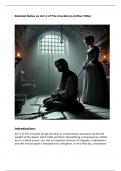Detailed Notes on Act 4 of The Crucible by Arthur Miller
Introduction:
Act 4 of The Crucible brings the play to a harrowing conclusion as the full
weight of the Salem witch trials and their devastating consequences unfold.
Set in a bleak prison cell, the act explores themes of integrity, redemption,
and the human spirit’s resistance to corruption. In this final act, characters
, grapple with their moral choices, leading to moments of intense emotion and
tragedy. These notes provide an in-depth analysis of the key events,
characters, and themes, supplemented with visual imagery to enhance
understanding and engagement.
1. Summary of Act 4
Act 4 is set in the Salem jail, where John Proctor and other accused witches
await execution. Reverend Hale, filled with guilt over his role in the trials,
pleads with the prisoners to confess, hoping to save their lives, even if the
confessions are lies. He especially tries to persuade John Proctor, who
struggles with the decision to confess to witchcraft to avoid execution or
maintain his integrity and die for the truth.
Elizabeth Proctor visits John, and their final conversation is filled with
emotion and reconciliation. John ultimately decides not to confess, despite
immense pressure from the court, choosing to preserve his integrity and die
an honest man. The act ends with John’s execution, and Elizabeth, though
heartbroken, recognizes the nobility of his choice.
2. Key Characters in Act 4
Act 4 focuses on the moral dilemmas faced by the main characters,
particularly John Proctor, as they confront the reality of death and the weight
of their decisions.
John Proctor:
Role in the Plot:
Proctor's decision to die rather than falsely confess becomes the moral
centrepiece of the act. His internal struggle between self-preservation and
integrity is a poignant exploration of personal redemption.
Character Traits:
Honest, conflicted, resolute.
Importance:





